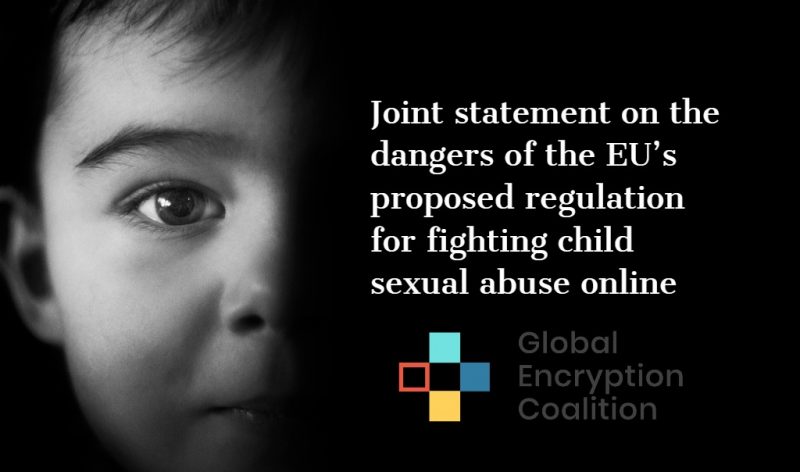Declaração conjunta sobre os perigos do regulamento proposto pela UE para combater o abuso sexual infantil online

The undersigned organizations, companies, and cybersecurity, them the Crypto ID Portal, experts issued the following statement in response to the Regulation on Child Sexual Abuse (CSA) that the European Commission proposed on 11 May 2022:
Child sexual abuse is a serious crime that must be addressed by Member states and by other countries around the world. We are concerned, though, that the approach taken by the Commission in this proposed Regulation would have devastating impacts on the security of communications and on user privacy.
The Commission’s legislation would enable Member States to compel online platforms, including those offering end-to-end encrypted messaging, to scan users’ content and metadata for CSA images and for “grooming” conversations and behavior, and where appropriate, report them to public authorities and delete them from their platforms. Such a requirement is fundamentally incompatible with end-to-end encrypted messaging because platforms that offer such service cannot access communications content.
This has been confirmed by experts around the world who produced an analysis of how any form of scanning breaks end-to-end encrypted systems in addition to a detailed report on the multiple ways in which client-side scanning, in particular, “can fail, can be evaded, and can be abused.”
Instead of mandating measures that are inconsistent with end-to-end encryption and would diminish the security of everyone, regulators should incentivize measures that address CSA and protect communications security. Among these measures are facilitating user reporting of CSA material.
As organizações, empresas e especialistas em segurança cibernética relacionadas abaixo entre elas o Portal Crypto ID, emitiram a seguinte declaração em resposta ao Regulamento sobre Abuso Sexual Infantil (CSA) que a Comissão Europeia propôs em 11 de maio de 2022:
O abuso sexual infantil é um crime grave que deve ser combatido pelos Estados Membros e por outros países ao redor do mundo. Preocupa-nos, porém, que a abordagem adoptada pela Comissão nesta proposta de regulamento tenha impactos devastadores na segurança das comunicações e na privacidade dos utilizadores.
A legislação da Comissão permitiria aos Estados-Membros obrigar as plataformas em linha, incluindo as que oferecem mensagens encriptadas fim-a-fim, a verificar o conteúdo e os metadados dos utilizadores em busca de imagens CSA e de conversas e comportamentos de “alimentação” e, se for caso disso, denunciá-los ao público autoridades e excluí-los de suas plataformas. Esse requisito é fundamentalmente incompatível com mensagens criptografadas de ponta a ponta porque as plataformas que oferecem esse serviço não podem acessar o conteúdo das comunicações.
Isso foi confirmado por especialistas em todo o mundo que produziram uma análise de como qualquer forma de varredura quebra sistemas criptografados de ponta a ponta, além de um relatório detalhado sobre as várias maneiras pelas quais a varredura do lado do cliente, em particular, “pode falhar, pode ser evitado e pode ser abusado”.
Em vez de exigir medidas que sejam inconsistentes com a criptografia de ponta a ponta e diminuiriam a segurança de todos, os reguladores devem incentivar medidas que abordem a CSA e protejam a segurança das comunicações. Entre essas medidas estão a facilitação do relato de material de CSA pelos usuários.
Signatories – Affiliations listed for identification purposes only
Adam Shostack, Author, Threat Modeling: Designing for Security
Alec Muffett, Security Researcher
Article 19
Associação Portuguesa para a Promoção da Segurança da Informação (AP2SI)
Bits of Freedom
Blacknight
Calyx Institute
Centre for Democracy & Technology
Christopher Parsons, Senior Research Associate, Citizen Lab, Munk School of Global Affairs & Public Policy at the University of Toronto
Collaboration on International ICT Policy for East and Southern Africa (CIPESA)
Committee to Protect Journalists (CPJ)
comun.al, Digital Resilience Lab – Mexico
Council of European Professional Informatics Societies (CEPIS)
Crypto ID
Digital Rights Ireland
Dotzon GmbH
Douwe Korff, Emeritus Professor of International Law, London Metropolitan University
Electronic Frontier Foundation
Electronic Privacy Information Center (EPIC)
Element
Prof. Dr. Elena Andreeva, TU Wien
Encryption Europe
Encrypt Uganda
Epicenter.works – for digital rights
EySoft IT Solution
Global Partners Digital
Hans Peter Dittler, ISOC.DE
Prof. Dr. LL.M. Indra Spiecker
Internet Society
Internet Society Brazil Chapter
Internet Society Catalan Chapter
Internet Society Finland Chapter
Internet Society Ghana Chapter
Internet Society German Chapter (ISOC.DE e. V.)
IP.rec – Law and Technology Research Institute of Recife
Iuridicum Remedium (IuRe)
J. Alex Halderman Professor, Computer Science and Engineering, Director, Center for Computer Security and Society, University of Michigan
JCA-NET
Jon Callas, Director of Technology Projects, Electronic Frontier Foundation
Julf Helsingius
Prof. Dr. Kai Rannenberg, Chair of Mobile Business & Multilateral Security, Goethe University, Frankfurt
Prof Kapil Goyal, Alumni Fellow, Asia Pacific School of Internet Governance
Kimmo Halunen, Professor, University of Oulu
LAYLO
L Jean Camp, Professor of Computer Science and Informatics, Indiana University
Lorraine Kisselburgh, Purdue University
Luka Modic, Bachelor of Criminal Justice and security, University of Maribor, Faculty of Criminal Justice and Security
Mailfence.com
Meta
Olivier Blazy, Professor, Ecole Polytechnique
Ot van Daale, University of Amsterdam
Privacy & Access Council of Canada
Privacy International
Ranking Digital Rights
Riana Pfefferkorn, Research Scholar, Stanford Internet Observatory
Rich Compton, Principal Engineer
Dr. Roland Bless, Karlsruhe Institute of Technology (KIT)
SFLC.in
Sharon Polsky MAPP, Privacy & Data Protection Specialist, Privacy & Access Council of Canada
Sofía Celi, Cryptography Researcher
Susan Landau, Bridge Professor of Cyber Security and Policy, Tufts University
Sven Dietrich, Professor of Computer Science, City University of New York
Dr. Sven Herpig, Director for International Cybersecurity Policy, Stiftung Neue Verantwortung
Tech for Good Asia
Dr. Thorsten Strufe, Professor, KIT/KASTEL Karlsruhe and Centre for Internet CeTI at TU Dresden
Tresorit
Tutanota
Youth Forum for Social Justice
X-Lab

Comemorando 5 anos da Coalizão Global de Criptografia
Nos cinco anos desde seu lançamento em 14 de maio de 2020, a Global Encryption Coalition (GEC) e seus membros remodelaram o debate mundial em torno da criptografia.
A Coalizão surgiu em tempos de incerteza, enquanto o mundo enfrentava os primeiros meses de uma pandemia global. Com apenas 37 membros da sociedade civil em sua fundação, a Coalizão foi formada com o objetivo de promover e defender o uso de criptografia forte em todo o mundo. Desde então, a Coalizão cresceu e agora conta com 466 membros de 108 países, incluindo organizações da sociedade civil, empresas e especialistas em segurança cibernética que trabalharam juntos para informar e impactar efetivamente os debates políticos globais sobre criptografia.
Crypto ID é um dos membros do Global Encryption Coalition e mantém uma coluna com os principais artigos. Acesse aqui!































